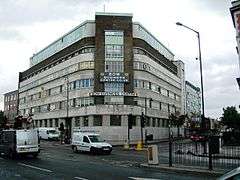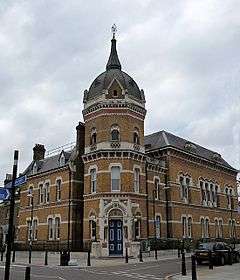Poplar Town Hall
Poplar Town Hall is a municipal building at the corner of Bow Road and Fairfield Road in Poplar, London. It is a Grade II listed building.[1]
| Poplar Town Hall | |
|---|---|
 The new Poplar Town Hall | |
| Location | Bow Road, Poplar |
| Coordinates | 51.5284°N 0.0198°W |
| Built | 1938 |
| Architect | Culpin and Son |
| Architectural style(s) | Moderist style |
Listed Building – Grade II | |
| Designated | 24 February 2009 |
| Reference no. | 1393151 |
 Shown in Tower Hamlets | |
History

The building was commissioned to replace an aging mid-19th century municipal building with a distinctive octagonal tower and dome and mosaic detail on Poplar High Street[2] which had become the headquarters of the Metropolitan Borough of Poplar in 1900.[2][3] The old building on the High Street had been the scene of the Poplar Rates Rebellion, led by George Lansbury, which resulted in 19 councilors being put in prison.[4] The council sold the old town hall to a developer in 2011 and it was subsequently converted into a hotel.[4][5]
The site for the new building had been occupied by a 19th century vestry hall.[2] The new building, which was designed by Culpin and Son in the Moderist style and built in the form of a trapezoid, was completed in December 1938.[1] The Builders by sculptor David Evans is a frieze on the face of the building, unveiled by Lansbury on 10 December 1938: the Portland Stone panels commemorate the trades constructing the Town Hall and symbolise the borough's relationship with the River Thames and the youth of Poplar.[6] It was proclaimed by the council to be the first town hall to be erected in the modernist style[2] but ceased to function as the local seat of government when the enlarged London Borough of Tower Hamlets was formed in 1965.[7]
After being used as workspace by the council until the mid-1980s, the town hall was converted for commercial use in the 1990s and subsequently used as a business centre.[2]
References
- Historic England. "Former Polar Town Hall (Bow House), 157 Bow Road (1065243)". National Heritage List for England. Retrieved 15 May 2020.
- "London's Town Halls". Historic England. p. 180. Retrieved 15 May 2020.
- Historic England. "Old Poplar Town Hall and Council Offices (1260135)". National Heritage List for England. Retrieved 15 May 2020.
- Brooke, Mike (22 January 2014). "Fury at Tower Hamlets over knock-down sale of old Poplar Town Hall". East London Advertiser. Retrieved 15 May 2020.
- "Poplar Town Hall owner Mujibul Islam receives apology and damages from The Telegraph in libel case". East London News. 13 May 2016. Retrieved 15 May 2020.
- Public Monument & Sculpture Association Archived 16 July 2011 at the Wayback Machine date accessed 1 April 2007
- "Local Government Act 1963". Legislation.gov.uk. Retrieved 25 April 2020.